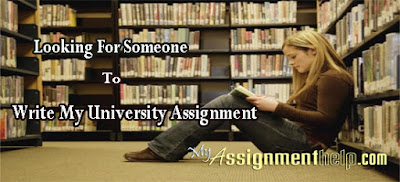Many worry about starting an assignment, but
ignore the importance of ending an assignment perfectly. Conclusion is the last
chance to persuade your readers to the point of view and impress them as a
thinker, researcher and writer. It is the part that stays with the readers
after they finish reading it. But many students fail to create an impactful
assignment conclusion because they struggle to understand the essentials of
writing an effective conclusion. To provide you needed university assignment help, we have come up with a few strategies on
how to end the assignment perfectly.
In order to end your assignment with an
impact, you need to follow a few steps described here:
Establishing the sense of closure
Your readers have to understand the
assignment has come to an end. You need to warp the ideas it this part and
remind your readers the points you have already mentioned in the writing. To
give your readers a sense of closure, you might do one or two things following,
- Conclude by linking the first paragraph:
You need to end the assignment by relating your
conclusion to the introduction. That means you need to restate the thesis
statement in the conclusion in order to make the readers understand the purpose
of creating the assignment.
- Conclude the ending sentence with one-syllable words:
Keep it simple to make readers understand the
impact of the words. It is said that simple words make more impact than the
complex words. Many students use complex words to create a good impression on
the professors. If you need a practical example, you can download assignment
samples from the internet. Many assignment writing service providers display a number of assignment examples to help
students.
Closing the paragraph without closing it
The primary aim of the essay is to engage readers in the topic. To make your readers think more on the topic after reading the assignment, you might want to do one or two of the following things:
- Conclude with a quotation:
Place a quote from the references of
primary or secondary sources. Choose a quote that reflects the core idea of your
assignment writing from a different perspective. A quotation from a book,
journal or article, can add texture to your writing. Let’s say you are writing
a literary essay on the importance of home in James’s Joyce short story
collection. You might want to end the essay with a biographer’s statement about
Joyce’s attitude toward Dublin. Remember, when quoting words from sources,
acknowledge every source you involve in your writing. The reason is, plagiarism
is a sin in assignment writing. Check the paper under authentic plagiarism
detector software. There are many free plagiarism checkers available on the internet.
- Conclude by setting a larger picture:
To instigate the readers’ thinking, you
need to put the subject in the bigger setting so that they understand the
importance of the subject. It leads them to think more about the topic even after
finish reading it.
- Conclude by redefining key terms of argument:
Argument comprises a few vital points. When
ending the assignment, you need to remind your readers one of two vital points
that you discussed in the body paragraphs. Assignment experts use this trick to make their writing more appealing to the
audience. It strengthens the presented points and give readers the chance to
relate back the points.
- Conclude by interpreting your argument differently:
What does your argument suggest, imply or
reflect? Have you touched every aspect of your argument? Have you cleared your
points in the light of the subject? Conclusion is the last part where you can
convey those words and points that you have not touched yet. You can present
your argument in a different manner. Ideally, experts advise not to use fresh
ideas in the section of the conclusion, but you can make related points in the
conclusion. Remember, the point can be new, but it has to be related.
Don’t simply
summarize the presented points in conclusion, because it does not create any
impression on the readers’ mind. The conclusion has to be distinctive and
reflect your thinking and personality. If you feel overwhelmed by the
regulations of writing the conclusion, you can take help from professionals and
experts. Professional help is just one click away from you.

This comment has been removed by a blog administrator.
ReplyDelete